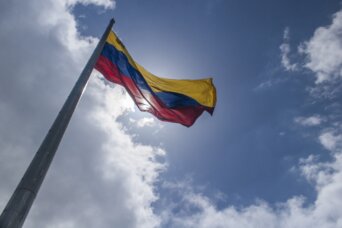- About
- Topics
- Picks
- Audio
- Story
- In-Depth
- Opinion
- News
- Donate
- Signup for our newsletterOur Editors' Best Picks.Send
Read, Debate: Engage.
| topic: | Election |
|---|---|
| located: | Venezuela |
| editor: | Ellen Nemitz |
President Nicolás Maduro and opposition leaders have begun a series of conversations to overcome the uncertainties that led Venezuela to a profound humanitarian and economic crisis.
The country has been subjected to poverty, resource scarcity and violence since the beginning of the crisis, which, among many factors, was a consequence of the drop in oil prices in 2014, electoral fraud accusations and the polarisation against the former president, Hugo Chavez - and later against his successor, Maduro.
In 2019, the opposition leader, then president of the National Assembly, Juan Guaidó proclaimed himself president and its legitimacy was recognised by several countries.
The current negotiations are being held in Mexico with international intervention. On 13 August, Maduro’s representatives and opposition leaders signed a memorandum of understanding, according to The Economist, agreeing to "hold fair elections in return for the lifting of international sanctions." Even though the dialogue was resumed on 3 September, The Economist believes that it can last "for months or even years" - analysts and people are, in general, not so optimistic as this is not the first time that the opposition tries to negotiate with Maduro.
On Twitter, Guaidó stated that the objective for the “national salvation deal” is to establish conditions for fair regional elections this year and presidential elections in 2024. On his part, Maduro’s strict goal is to end economic sanctions on the country. Although he denies that there are two power cores in Venezuela, he is willing to negotiate towards political stability, according to an interview with Al Mayadeen.
The Unitary Platform - a consortium of several opposition parties - announced that it will participate in the upcoming regional elections in November, despite its previous electoral boycott of elections due to an alleged lack of transparency. The decision is based on the belief that the simple act of attending the elections is important for the struggle towards a democratic path - even if conditions are not yet fair. However, there is no consensus around this strategy and some politicians believe that it could strengthen Maduro's power and his chances for victory in the 2024 elections.
Moreover, the aims of the negotiations carried out in Mexico must include humanitarian issues, such as providing better living conditions for people who remain in Venezuela. "Venezuela is not a country formally at war, but it is not a country at peace either. A devastated nation whose inhabitants do everything humanly possible to subsist in the midst of the vulnerability caused by the many dangers that threaten it," says Luz Mely Reyes, a political analyst for the Washington Post, calling the dialogue a "life or death negotiation".
The political disputes in Venezuela will most likely require more than a few rounds of conversation to resolve as many hidden aspects may be involved. In a recent web-conference entitled "The allies that back up Chavismo: affinity or opportunism?," panelists explained that a net of supporting countries, such as Russia and China, allow Venezuela to keep its current economic and political structure. Restoring democracy and economic sustainability will thus take time and "require a political change that leads to another type of institutionality."
Image by Alexander Rodriguez
